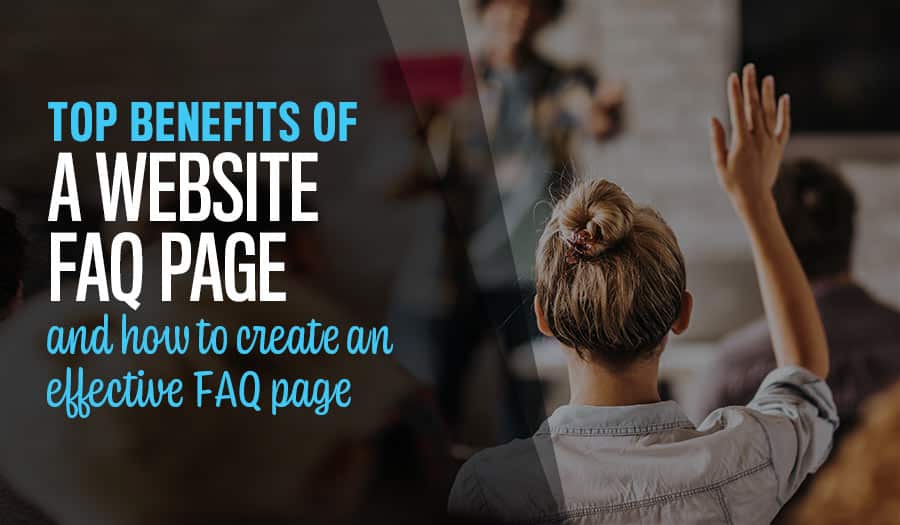FAQ stands for Frequently Asked Questions, commonly documented on a helpful web page. A website FAQ is a powerful tool that serves three vital purposes all in one: FAQs instill customer confidence, boost lead conversion, and provide automated customer service in the most approachable way possible. Everyone understands a FAQ and many leads will go looking for it as part of the decision-making process. A FAQ can be a single page of questions and answers or an entire knowledge base of answers commonly sought out by new and returning customers.
It’s a wonder that not all websites have a FAQ. The page alone is valuable and the resources that stem from online documentation are extremely beneficial. The best thing about a page for frequently asked questions is the variety of purposes it can – and does – serve. Let’s dive into the benefits of a website FAQ page. Then we’ll explore how to build a great FAQ page for your site.
Top Website FAQ Page Benefits
- Quick-Answers Customer Questions
- Boost in Lead Conversion
- Streamlines the New Client Experience
- Powerful SEO with Question-Based Inbound Marketing
- Improves Site Navigation and Search Function
- Grows Into an Information Center
- Fewer Customer Service Calls
- Authority Position with Informed Answers
- Inspire Extensive Blog and Newsletter Content
Website FAQs serve many purposes, most importantly, they are a universal tool for self-serve customer service. Leads, customers, and even search engine crawlers can gain quick answers to common questions without contacting customer service. The magic happens in the synergy of a Frequently Asked Questions page and the user experience of your website.
Top Website FAQ Page Benefits
Here are the individual top benefits of building an effective FAQ page:
1. Quick-Answers Customer Questions
Customers often have quick questions that deserve quick answers. How much is shipping? What is your return policy? How do I reset my password? These questions shouldn’t require an entire customer service experience. Customers shouldn’t have to make a phone call, connect through live chat, or find you on social media to get the answers. Those answers should be readily available – even if customers don’t know which information page to look for. Even if you have a shipping info page, including shipping questions on your FAQ means quick-question customers can get quick answers on the fly.
The more complete (and navigable) your FAQ becomes, the more you can provide those instant answers that make for a smooth and enjoyable customer experience.
2. Boost in Lead Conversion
Unsurprisingly, a source of quick answers also improves lead conversion. Leads often bounce when they can’t make a firm decision. Having access to quick, helpful answers can significantly increase the number of leads who choose to purchase with greater confidence. Leads often have a variety of questions to help them confirm that your company is the right choice, and a FAQ can help you cover all the usual bases.
Leads who would buy if they knew – for certain – that the order would meet their needs can find out quickly in the FAQ without the risk of customer service outreach becoming a bridge too far.
3. Streamlines the New Client Experience
Frequently asked questions are most frequently asked by new customers – those who don’t yet know your platform and policies inside and out. Your FAQ is the ideal place to send new customers to answer all those questions that immediately jump to mind in the early customer experience. Membership and login, shipping and returns, mobile alerts, community rules, package tracking – all of these things can be sorted into your FAQ with answers written in an easy quick-reference format.
4. Powerful SEO with Question-Based Inbound Marketing
Building On-Site SEO is always a worthy effort when it comes to new pages on your website. Right now, question-and-answer content is extremely effective and favoured by search engine methods. If you want to get into the top-of-page snippets, then write common questions and succinct answers in your FAQ. Want to show up for long-tail searches phrased like questions? Write a detailed FAQ with individual answer pages.
A Frequently Asked Questions section covers a wide range of industry information which means inbound marketing cold. SERP to snippets, you’ll see the benefit.
5. Improves Site Navigation and Search Function
A FAQ is an ideal addition to your site map because it organises information and provides internal links back to the website structure. Most importantly, it turns customer searches into answers and conversions. A FAQ gives you a real reason to have a search-bar in your menu because customers can route to exactly the answers or products they are looking for.
Queries route to the FAQ which provides a quick answer and routes asker back to the main site with links to relevant pages. This creates an end-around that helps customers navigate your site even if they are unfamiliar with the site map or menu structure.
6. Grows Into an Information Center
Just starting with a brief FAQ page can eventually grow into an entire information centre and self-service platform. Give customers the ability to search internally. Host pages dedicated to specific frequently-asked topics. Expand your FAQ from a few quick answers to detailed documentation of information customers benefit from knowing. Then branch out with FAQ info for business partners and job applicants as well.
7. Fewer Customer Service Calls
Customers who can answer their own questions with a quick website search won’t need to ask your team. This means fewer tickets through phone and live chat to resolve. Your team spend much less time answering the same questions over and over. Customers who can navigate the site won’t have to ask how to find what they need. Customers who can research shipping and policies independently won’t call in just for the info.
This leaves your customer service team more time to focus on real customer problems and questions that cannot be handled with independent self-service.
8. Authority Position with Informed Answers
A well-written FAQ shows off your expertise in the field. The content should be written for a non-industry reader yet provide enough information to show that you have deeper insights into each formal topic. Customers and potential business partners browsing your FAQ will see that your team really knows their stuff based on how you write the answers. This can build trust in your customer base and a positive reputation in your industry.
9. Inspire Extensive Blog and Newsletter Content
Finally, a FAQ is a perfect inspiration for a blog or newsletter. Blogs are constantly in need of new, useful, and interesting topics. Your FAQ is a mine of things that customers want to know and might be interested in knowing with more in-depth content. Then you can link the FAQ answers to the blogs to offer customers an opportunity to ‘Read More’. The bigger your FAQ, the more inspiration you can pull from its catalogued data.
How to Create an Effective FAQ Page
Creating an effective FAQ page is an adventure unto itself. A FAQ page can be a simple HTML document with organised questions and answers or it can be an entire knowledge platform designed to answer common and uncommon questions the customers might want to ask. There are two steps to FAQ creation. The first is putting together your question-and-answer content, a mission that never needs to stop. The second is building the page and navigation structure to hold your questions in a UX-focused way.
The Frequently Asked Questions and Answers
Start by putting together two lists of questions – a quick-answer list and a for-your-information list. The quick-answer list is your FAQ front page, including your prime customer onboarding and lead conversion questions. From there, expand your FAQ section to include a wide range of interesting questions and answers that customers will want to know. Range out to the less frequently asked and pose some information you want clients to know in the form of questions and answers. Try the following sources for FAQ questions to start with and expand into:
-
Quick Answers on Company Policies
-
Lead-Conversion and Customer-Onboarding Answers
-
Most Frequent Questions Asked to Customer Service
-
Interesting Technical Facts as Questions and Answers
Building the FAQ Page Itself
Most of us know from many years on the internet that there are good and bad FAQs. A good FAQ is easy to skim because the questions are highlighted and the answers fit neatly underneath them. The negative opposite is a FAQ with barely any spacing or bolding that reads like a Star Wars intro without the paragraph breaks. The best FAQS, of course, are full-blown information centres with categories and quick buttons that make FAQ navigation a breeze.
Organised and Easy to Read One Question at a Time
Start with organisation and readability. Will your FAQ be a modest single page of questions or a spiderweb of individual answer pages? Either way, each question should be easy to spot, pick out, and read individually. Your questions and answers should never run together – err on the side of more space between questions, not less.
Sort your questions by category and frequency at first. As your FAQ section grows, sort by topic, category, department, and even UX funnel as needed. Be sure to prioritise easy navigation and clean visual design at all times.
Optimised for On-Site and Off-Site Search Results
Optimise your FAQ to receive search results. On-Site search results should favour FAQ pages if a ‘best match’ result is unavailable. If your search engine has no idea what the user wants, send them the FAQ landing page to see if they can navigate their way to the right answer.
For off-site SEO, ensure your titles and metadata align to the current Google standards. Use proper headers for each question and you may seen see some of your FAQ used for industry question snippets.
Build an Information Center
As your FAQ grows, consider building an online information centre to hold all your documentation. An information centre adds an extra layer of navigation and answer-finding to the UI. Often, it separates questions into categories and individual answers – then adds a navigation layer of buttons and images to help users find the answers they were looking for.
Information centres often go above and beyond, taking your FAQ into realms of actual onboarding with a quick link to live chat support in case the FAQ was not complete enough for every customer’s needs.
Building a Powerful FAQ Page for Your Website
Frequently Asked Question pages have the potential for powerful benefits. From customer experience to SEO results, your FAQ has the potential to become one of the site’s most valuable assets. Your FAQ content can rise above competitive content by providing clear, expert answers to common new customer questions. For more insights on how to build a FAQ page or to work with a team who knows their FAQs inside and out, contact us today!
Take your business to the next level with a Pixel Fish Website.
Check out some of our latest Website Design projects.
Further Reading
10 Tips that Maximise Your WordPress Website Design ROI
12 Tactics to Increase Your WordPress Website Speed
10 Best Practices for Installing New WordPress Plugins
5 Tips for Boosting Your E-Commerce Sales at Christmas
SEO Backlinks Best Practices for Search Engine Success
The Impact of The Internet of Things on Web Design
The Future of Social Media for Small Businesses
Top 10 Ways for Using Video on Your Website
7 Ways to Boost your Website Credibility
8 Top Website Content Tips for your business
9 Ways to Optimise your Website for Voice Search



